Newsletter
Oct
4
2022
Welcome to the Tuesday News Bulletin! Jewish Currents is constantly getting quotes and scooplets from our network of sources, and every Tuesday, we release small stories exclusive to our newsletter subscribers in emails like this one. In addition to original reporting, the Tuesday News Bulletin serves as a forum for aggregating stories Jewish Currents staffers are tracking, with plenty of links to other publications so you can keep up with everything happening on our beats.
If you have more stories or tips, you can reach Alex Kane at alex@jewishcurrents.org.
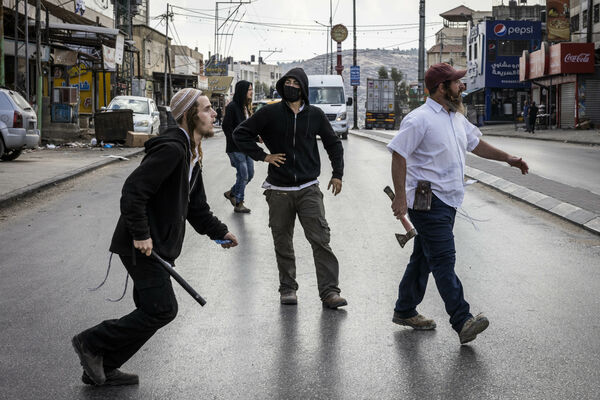
Israeli settlers invade the Palestinian village of Huwara, attacking residents and damaging property.
October 18th, 2022
(Note: This Tuesday News Bulletin is a guest post from Jewish Currents Contributing Editor Joshua Leifer and the Activestills photo collective.)
On October 8th, Palestinian gunman Udai Tamimi shot and killed Noa Lazar, an Israeli military policewoman, and gravely wounded a private security guard at the Shuafat checkpoint in occupied East Jerusalem. In response, the Israeli army placed the Shuafat refugee camp under total closure as it launched a manhunt for the gunman. Shuafat is home to more than 100,000 Palestinians, and is the only such camp that lies within the boundaries of the Jerusalem municipality, cut off from the rest of the West Bank by the separation barrier. The sealing off of entire Palestinian towns and neighborhoods, which prevents Palestinian residents from leaving for work or study, is a tactic frequently used by the Israeli army, especially following attacks by Palestinian militants; human rights groups such as B’Tselem consider such restrictions on movement to be a form of collective punishment of civilians and thus a violation of international law.
The shooting at the Shuafat checkpoint provided the Israeli army with a pretext to intensify its already ongoing efforts to crush the reemergence of increasingly assertive armed Palestinian groups, such as the Nablus-based “Lion’s Den,” a group comprised of young Palestinian men unaffiliated with any established political faction, who have claimed responsibility for a series of attacks on Israeli soldiers and settlers in the West Bank since the spring. Most recently, Lion’s Den militants claimed responsibility for the October 11th killing of Israeli soldier Ido Baruch near the Jewish settlement of Shavei Shomron. In Jenin and Nablus, Israeli forces have conducted near-nightly raids aimed at these groups over the last few months, sometimes encountering armed resistance. They have killed more than a dozen Palestinians during these raids, including multiple children. Since the beginning of the year, Israeli military forces and settlers have killed more than 100 Palestinians—the highest number of Palestinian casualities in the occupied West Bank since 2015. Over 1,500 Palestinians have been arrested.
Israeli settler violence, which has been steadily increasing over the last several months, also exploded last week after Palestinians fired on Israeli settlers’ cars on roads outside Nablus, in the northern West Bank. On October 13th, Israeli settlers, backed by Israeli army personnel, rampaged through the nearby town of Huwara. Settlers burned olive trees, damaged Palestinian businesses and property, and attacked Palestinian residents with rocks and iron bars, leaving dozens injured. The next day, an Israeli soldier was caught on video exiting his private car and shooting at a Palestinian house in Huwara. While the Israeli army has long turned a blind eye to settler violence in the West Bank, the assault on Huwara last Thursday joins a growing list of instances in which Israeli soldiers have joined in settler mob violence and militia-style attacks against Palestinians.
Also on Thursday night, large groups of far-right Israeli youths and settlers stormed the East Jerusalem neighborhood of Sheikh Jarrah, throwing stones at Palestinian houses and counter-demonstrators. Member of Knesset Itamar Ben-Gvir, leader of the Kahanist Jewish Power party, joined the far-right and settler activists. When Palestinians in the neighborhood met Ben-Gvir with rocks, the MK pulled out his handgun and demanded that Israeli police in the area shoot any Palestinian throwing stones. “Friends, they’re throwing rocks at us,” he told the police. “Shoot them.” Far-right Israeli activists shattered the windshields of cars in the neighborhood and broke the windows of Palestinian homes. Israeli authorities reported two Israeli Jews injured during the violence in Sheikh Jarrah, while the Palestinian Red Crescent reported that it had treated more than two dozen people following the attack by far-right activists on the neighborhood. One Palestinian man, Mohammed Zahran, remains in the hospital with serious head injuries after far-right youth beat him with a metal bar.
The far-right and settler attacks in East Jerusalem subsided over the weekend, but the wave of violence points toward a new dynamic on the ground. In Jenin and Nablus, a younger generation of Palestinians is confronting the immovability of the occupation and the fecklessness of the Palestinian Authority. The residents of Shuafat protested the lockdown and, on October 12th, declared a general strike, in which they were joined by the residents of Nablus and East Jerusalem. Palestinian youth threw rocks and molotov cocktails at Israeli soldiers in Shuafat, who responded with tear gas, stun grenades, and sponge-tipped bullets. At the same time, Israeli settlers in the northern West Bank are growing ever more frustrated by the daily reminders, in the form of Palestinian resistance, that they live in the heart of occupied territory; even as they call on the Israeli army to act with an even heavier hand, settlers like the ones who attacked Huwara are threatening to take matters into their own.
Here is a selection of photos from Activestills, a collective of documentary photographers in Palestine/Israel, covering last week’s violence in East Jerusalem and the West Bank.
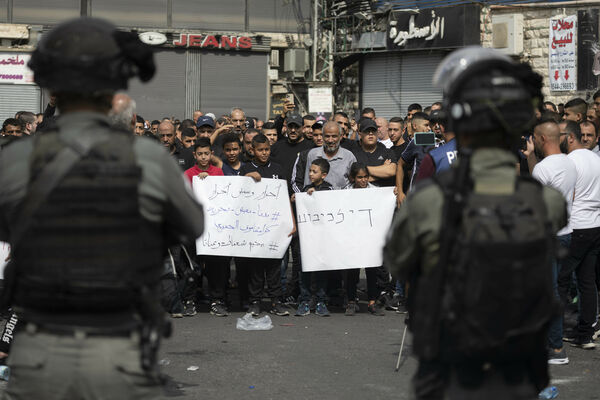
Israeli police and army forces enter Shuafat refugee camp, armed with crowd dispersal weapons, as residents protest the total closure of the camp on October 12th, 2022.
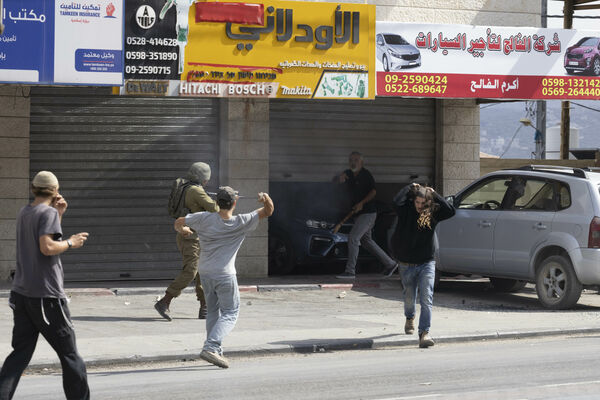
Settlers smash the windows of Palestinian cars and shops in the village of Huwara while the Israeli army stands by on October 13th, 2022.
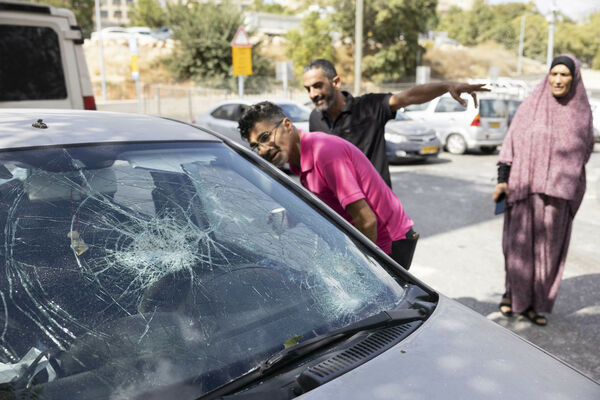
Hundreds of Israeli settlers gather in the Sheikh Jarrah neighborhood of East Jerusalem, attacking residents and smashing the car windows, on October 13th, 2022.

Residents of the Jenin refugee camp carry the bodies of Mateen Dabaya and Abdallah Al-Ahmad, two men who were killed in an Israeli raid, in a funeral procession on October 14th, 2022.
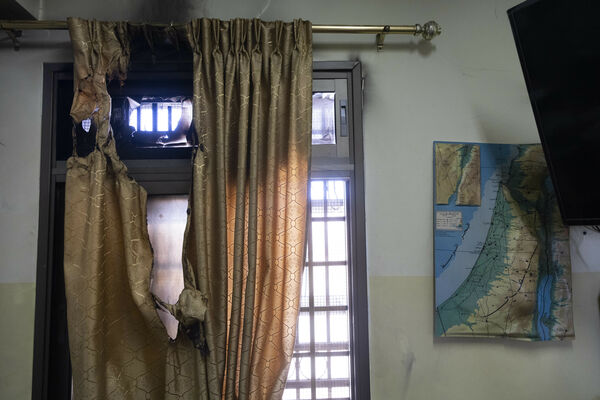
Israeli settlers attack a Palestinian school in the West Bank village of Urif, outside Nablus, setting fire to the principal’s office, on October 15th, 2022.
- The Palestinian legal organization Adalah is calling for an immediate end to the closure of Shuafat refugee camp and nearby Jerusalem neighborhoods. In a letter sent to Israeli security and legal officials, Adalah argued that the closure constitutes collective punishment and is a violation of international and Israeli law. The group also demanded that Israeli forces stop cutting electrical power to the neighborhood, spraying the area with foul-smelling “skunk” water, and firing tear gas against protesters.
- Israeli authorities revoked entry permits for 164 relatives of alleged members of the Lions’ Den, the Nablus-based Palestinian armed group. This year, Israel has revoked the entry and work permits for over 2,500 Palestinians whose relatives are alleged to have committed armed attacks against Israelis. Israeli forces also frequently demolish the homes of Palestinian attackers who are dead or in jail, displacing their families. Human rights organizations maintain that Israeli policies targeting the family members of militants amount to an illegal form of collective punishment.
- Documents uncovered by Israeli historians Benny Morris and Benjamin Kedar confirm that Israeli forces deliberately attempted to poison the water supplies of Palestinian villages and cities during the founding of the State of Israel in 1948, a time when an estimated 750,000 Palestinians fled their homes or were expelled by Zionist militias and Israeli forces. The contamination of drinking water in the city of Acre left dozens of Palestinians ill. In 2003, Palestinian historian Salman Abu Sitta unearthed Red Cross documents that discussed a “typhoid epidemic” in Acre caused by Israel’s poisoning of the water supply. Israeli forces also tried to poison Gaza’s drinking water, but their operatives were caught and executed by Egyptian soldiers. The documents that Morris and Kedar found show that the planned operation was much broader in scope and involved more Israeli officials than previously known.
- Australia’s center-left Labor Party government rescinded its predecessor’s 2018 recognition of West Jerusalem as Israel’s capital, angering Israeli Prime Minister Yair Lapid, who said in response that “Jerusalem is the eternal and united capital of Israel and nothing will ever change that.” After US President Donald Trump’s 2017 decision to recognize Jerusalem as Israel’s capital, Australia’s then-prime minister Scott Morrison followed suit, although unlike Trump he specified Australia recognized the western half of Jerusalem as Israel’s capital. Israel took control of West Jerusalem in 1948 during the country’s founding, and annexed East Jerusalem in 1967. Most countries around the world did not recognize Israel’s conquest of East Jerusalem. Australia’s foreign minister said this week that the former right-wing prime minister’s decision was a “cynical play” to win Jewish votes, and said that while Australia remains a “steadfast friend” to Israel, the country’s position is that Jerusalem’s status should be subject to negotiations between Israelis and Palestinians. Palestinians view East Jerusalem as the capital of a future state of Palestine.
- Congressman Don Beyerwrote to Secretary of State Antony Blinken asking that the US not admit Israel into its visa waiver program because of Israel’s discriminatory practices targeting US citizens, particularly those of Palestinian descent. Beyer is circulating the letter to other members of Congress to secure their signatures. Israel has long wanted to join the visa waiver program, which would allow Israeli nationals the ability to travel to the US without the onerous process of securing a visa ahead of time. The Biden administration has said ensuring Israel’s entry into the program is a priority. But the US rules for the program require that Israel treat all American travelers to Israel and the occupied Palestinian territories equally. However, Israel routinely interrogates and denies entry to US travelers of Palestinian or Arab descent. Moreover, Israel is in the process of codifying new requirements that Israeli human rights group HaMoked says would be “highly restrictive” and would “needlessly [hamper] the entry of foreign passport holders to the [Palestinian territories] and their ability to stay there without interruption.” Based on these current and future border policies, Beyer wants to keep Israel out of the visa waiver program. “[Israel’s] decision to escalate discrimination by codifying regulations is especially disconcerting given the desire of both the United States and Israel to admit Israel into the VWP,” Beyer wrote in his letter.